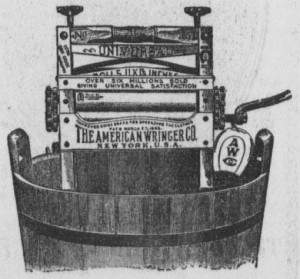Challenges facing remote Irish mortgage hunters
I decided to follow up the last post on the blog (a guest article about the challenges facing remote buyers) with another on the topic of housing. I consistently get one to two emails every week on the topic of mortgages. What I have discovered over the past few months is that there are many of you out there who are looking to buy a home while living overseas, but are having extreme difficulty in securing a mortgage. Many of you refer to my article from some time ago which goes in to detail about what I encountered while looking for a mortgage. As relevant as the information might be to most mortgage-seekers, the article was written from the perspective of someone living in Ireland. People living overseas, Irish citizens and non-Irish, are finding that banks don't really offer great options for them with regard to mortgages. With that in mind, I did some digging.
Why so secretive?

If you click over to the website of any of the major Irish banks, you will find that there is very little information there for overseas buyers. In fact, some of them don't even mention it. This is really odd, especially considering that there seems to be a steady flow of interest from investors living elsewhere in the world, and a large percentage of Irish emigrants interested in buying a home back in Ireland, with a view to one day possibly returning to it.
As mentioned, I didn't find much of anything online to help people get a feel for what to expect. Of course people can expect to be put through the wringer in the same way Irish residents are, but it would make perfect sense that there would be additional requirements for the overseas mortgage hunter. Which is why I thought I'd find information without having to reach out via email. But that's what I had to do. Funnily (or is this just another Irish-ism?) a lot of banks don't even give you the option of contacting them via email anymore. At least, it was difficult to find email addresses on their websites. I managed to get one or 2, and the rest I contacted via a Facebook private message. In total I contacted 5, of which 4 replied. Not bad!
Is anyone there?
The first bank to reply would not give me any information by email. They insisted that they would not share personal information by email and that I would have to contact them by phone. When I replied that I was simply looking for "information or online booklets that would help overseas buyers by describing the requirements and options", all I got back was crickets! Nothing! No reply.
We'll get back to you
The second bank to get back to me (this one via Facebook) wanted to know if I already had an account with the bank. I wondered how that would matter to taking out a mortgage, but I have heard (and experienced firsthand) that it can. They also fed me some of the same frustrating spiel as the first bank..."I'm afraid we don't email for security, it would need to be a telephone number. Very sorry. " What would need to be secure about providing basic information you might ask. I did. And at that point the FB contact offered to pass along my information. 10 days later, and I've heard nothing since.
Feeling my frustration? I'm feeling yours, especially if you are genuinely looking to buy a home in Ireland, and the banks just won't give you the time of day.
Flat out no
Next up, we have 2 conflicting responses from the last two banks to respond.
"If you are living in the US and earning in Dollars we would not be able to process your mortgage application as we only do mortgages for customers who are earning in Euro." Whoa! Without getting my calculator out, I'm guessing that would rule out approximately 90% of the world's population from ever getting an Irish mortgage! (Wikipedia says there are approx 338 million people in the Eurozone). I followed up with this bank to see if this was a self-imposed restriction (i.e. by the bank in question), or something governed by the central bank. The polite lady replying to my emails informed me that this was a "banking regulation", and not something they had control over. The next bank to reply had a different story...
A glimmer of hope
Regarding currency, here's what the last bank had to say: " The recently introduced EU Directive in Mortgage lending limits the currencies we can take into consideration for a mortgage. We can only accept US Dollars, UK Sterling & Australia Dollars in addition to Euro to service a mortgage." The previous bank gave me the impression that every bank in Ireland was restricted to Euro-only loans, but here we see a bit more flexibility. As with many things to do with setting up a new life in Ireland, I can't find a good source of information for what exactly the requirements and restrictions are. I looked up the quoted EU directive, (link here) and it didn't say anything about restricting mortgages as a result of the currency earned by the applicant. However, based on the following statement in the directive, it is possible that the Irish banking regulators have imposed restrictions of their own (although if they have, they are not being applied consistently by the various banks) "Member States may further regulate foreign currency loans provided that such regulation is not applied with retrospective effect."
How much?!
So, the last bank to reply gave our mortgage hunting readers a little bit of a reprieve. This is what they have to offer: "Where you are planning to purchase a property from overseas the maximum LTV (loan to value) is 50% plus we need to see that the expected rental income is sufficient to service the mortgage." So in other words, they'll loan you up to 50% of the value of the home, and expect that the rent you might receive for your property (regardless of whether you will rent it out or not) will cover the monthly mortgage repayment amount. In addition to having to come up with a very sizable down-payment, you will also most likely be hit with higher than normal interest rates. The contact at the bank informed me that any kind of investment property will be subject to investment lending rates which "would typically be higher than home loan rates."
This bank also indicated that you need to be present in Ireland to sign the loan paperwork. Those of you reading in countries such as the US, where services such as DocuSign are common, might be disappointed with that tidbit of info.
What's next?
If you want to save yourself a significant amount of work and keep your stress levels to a minimum I strongly recommend going through a mortgage broker. This will be the quickest way to get an answer from a number of banks. From what I have found, you will need to pay an upfront fee, something in the region of 200-300 Euro. I think you'll look back on it as money well spent, especially if things work out in your favour. Find out what banks they will apply to on your behalf, so you can fill in the gaps yourself later if there are other banks to try. You also might want to contact a number of brokers, and find out if they have been successful in getting mortgage approval for other people in your situation.
If you'd prefer to go the route of contacting individual banks yourself, then I suggest you skip past any kind of electronic contact. Go straight to picking up the phone and dialing the mortgage department of every bank you are interested in.
I'm sure there is more information out there than I have been able to find to date. I would love to hear from anyone who is going through a mortgage overseas application as we speak, or from someone who has successfully been approved for one. Your advice and experience could be really valuable to others who will read your comments. Get in touch via the contact form, or write a comment below.
Disclaimer: I am not a mortgage advisor, broker, banker or anything else that would equip me to speak professionally on the topics of mortgages. I am just a guy who has applied for them, and who has taken it upon himself to find out why overseas mortgage hunters are having such a hard time securing any kind of loan in Ireland. If you need professional advice, please consult the relevant experts for help.
13 Comments Already
Leave a Reply
You must be logged in to post a comment.




Hi Liam, This is a very interesting topic for me. I used to trade US mortgages several years ago and could talk about this for hours. First, it seems as if the Irish banks don’t want to be in the mortgage business or they would provide an easier route. Second, look for institutions that do want to be in the business (think large cash holding entities, i.e. insurance co’s, hedge funds, pension funds, etc.). Third, at an 50% equity position (the lender) who wouldn’t want this business especially if the interest rate return is at higher than market rates. What is the demand really like for people that want mortgages on Ireland? I guess what I’m saying is if the demand is there, maybe I should look into creating US entity that would be content with being a mortgage lender in IRE. Having said that, the red tape might be a nightmare, but worth possibly looking into.
Hi Margaret
I agree that Irish banks don’t seem to want to be in the mortgage business. At least not to overseas buyers anyway. But when you consider that the Irish government are constantly pushing for people to invest in Ireland, and for expats to return home, it’s really odd that a manufactured roadblock such as this would exist. Keep in mind too that the big Irish banks are largely owned by the government too. (for example PTSB)
It’s probably not unheard of for US (or other foreign) firms to lend to people buying property in Ireland. I would have imagined that that would occur on a larger scale than single-family home buying though.
Thanks for chiming in.
Liam
HI, I am based in Germany and am fortunate enough that our German mortgage is fully paid off. Our German bank is very willing to offer a loan of up to 100K on a property in Ireland where our existing German property is the security. The interest rate is extremely attractive.
They offered 50,000 over five years at 1.35% and 100,00 over ten at around 1.7%.
I was also miffed at the complete lack of focus on returning immigrants on Irish Bank sites.
Hey Claude,
Thanks for your input. It’s good to know that there are other options available if personal circumstance is favourable.
I wonder if you didn’t have a German property, would they accept an Irish one as security?
Hi, this is a very timely article for me. My husband is an Irish citizen and we currently live in the USA, and have a US mortgage. We are looking at joining forces with his sister back home in Ireland and purchasing a residence jointly. My sister-in-law would live full time in the house and we would use it when we are back in Ireland. Neither my husband nor sister-in-law have bought in Ireland before. So our scenario is somewhat unusual – it’s not a buy-to-let and one of the two parties is non-resident in Ireland. Given some of the pitfalls of sourcing a decent mortgage that have been highlighted on this site, I’m wondering if we are better off just having her apply for the mortgage on her own and we would contribute financially and hopefully have joint names on the deeds. Any thoughts or advice? many thanks in advance, Sarah
Hi Sarah,
Thanks for sharing your unique scenario with us. I’m not sure how the banks would treat this situation. I guess there’s only one way to find out, and that is to go ahead and ask. If they won’t consider your income, then your sister-in-law would have to be able to afford the full repayment on her own. Of course, you could help her out, but the banks may not consider that when they are coming up with an approval amount.
I’d love to hear how things turn out, if you don’t mind sharing it here with us. It’s an interesting one.
Liam
Thanks Liam. I called a couple of mortgage brokers and they told me only one lender would consider a foreign currency mortgage and a second that would consider sterling only (a non-starter for us). On top of that, many lenders aren’t keen on the sibling borrowing arrangement. I’m waiting to hear back from that first lender. Will keep you posted.
Liam – I tried to contact you via the contact form to see if you would be able to share the name of the bank that stated it would take US dollars into account but I got an undeliverable. Will try again now.
No problem. I just emailed you
May I refresh this conversation? I have been reading from a few retirees that Ireland has a rule about not giving mortgages to people above a certain age. I believe this form of age discrimination is illegal in the U.S. and I wonder how U.S. banks get comfortable with doing such loans? Is it because of sufficient collateral?
Also, reverse mortgages are common in the States but not in the EU. Does anyone know a finance company in Ireland doing reverse mortgages?
Kevin
When I applied for mortgages in Ireland, they would not allow the term to exceed a number of years if it meant I’d be older than 65 at the end of it. With the exception of PTSB, who allowed for up to 70 years of age. I’d imagine there is something similar in the U.S. no? I mean, they’d hardly give a 60 year old a 30 year mortgage, right?
Thanks for the response Liam. Actually, U.S. laws forbids discrimination in housing on the basis of age. Although this is a right protected by the U.S. Constitution, I think that lenders get comfortable with it on the basis of standard underwriting criteria such as income to debt coverage tests and loan-to-value limits.
So yes, a 60 year old person in the U.S. will often qualify for a 30 year mortgage because the bank is comfortable that they are adequately protected in the event of a default or death.
But… An irish bank isn’t necessarily discriminating on housing. They are saying you don’t qualify for a mortgage (essentially just a product) based on age. There are other examples of products that people don’t qualify for based on age, auto insurance and car rentals are 2 that come to mind. Many suppliers restrict those to 25+. Or in the case of insurance, they jack up the price 5-10 times for young drivers.
One key difference too, is that US banks are private, so if the gov’t ends up footing the bill, they probably don’t mind. Irish banks are almost entirely state owned.